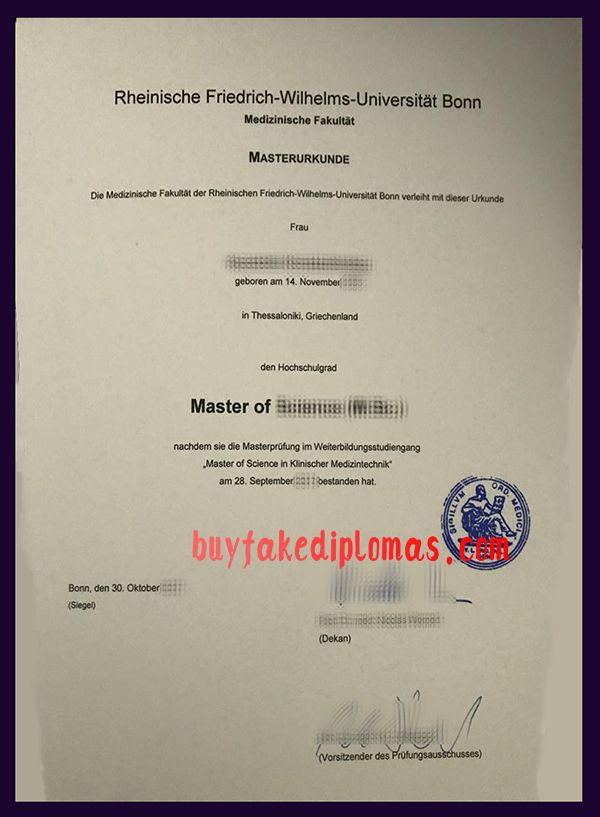We provide the best service at the most favorable price in the market. The original stamps / stickers, perfect and authentic seal and badge samples help you obtain the ideal certificate add our whatsapp: +86 15179517591
Fake Rheinische Friedrich-Wilhelms-Universität Bonn Degree

Rheinische Friedrich-Wilhelms-Universität Bonn Degree
This is a sample of the Rheinische Friedrich-Wilhelms-Universitat Bonn Degree certificate that we made. Our design team takes the original as the blueprint, combines the customer’s information to carry out the precise design, Our craft production team made this fake Rheinische Friedrich-Wilhelms-Universitat Bonn Degree certificate with the same spirit as the original. Our manufacturing techniques are well received by our customers. We also, based on customer demand, It also offers customized fake Rheinische Friedrich-Wilhelms-Universitat Bonn Diploma, fake Rheinische Friedrich-Wilhelms-Universitat Bonn Transcript as well as services for various fake certificates. We are always committed to helping customers who need to enhance their professional qualification competitiveness. With our help, you will get an ideal university diploma. A perfect report card; A beautiful professional qualification certificate can be used to find a decent job, a high salary and an ideal position. Contact us and it will not be a dream.
A product of the Enlightenment in the 18th century, the University of Bonn is renowned for its mathematics, social sciences (political science, law, philosophy and economics) and medicine. Graduates of the University of Bonn include Nobel, Fields, Leibniz and Pritzker Prize winners. Kaiser Wilhelm II of Germany, Adenauer, the first chancellor of Federal Germany, Marx, Habermas, Heine and Nietzsche all studied at Bonn University.
Rheinische Friedrich-Wilhelms-Universitat Bonn, named after Friedrich-Wilhelm III of Prussia, is a public university located in Bonn, North Rhine-Westphalia, Germany. He is also a member of the European University Union and the German U15 University Union. Its main building is located on the scenic Rhine River in Germany. It is a famous research university. During the 2016 summer semester, about 35,619 students were enrolled, including about 4,000 international students from all over the world. Among its most famous students are eight Nobel Prize winners, 14 Gottfried Wilhelm Leibniz Prize winners, two Fields Medal winners, Kaiser Wilhelm II, Pope Benedict XVI, poet Heine, music Saint Beethoven, Marx, the great revolutionary teacher, Konrad Adenauer, the first chancellor of the Federal Republic of Germany, Weimar Republic Prime Minister Heinrich Bruning, known as the “father of Europe” French Prime Minister Robert Schumann, Nietzsche, Joseph Schumpeter, Joseph Goebbels and so on.
She was a product of the Enlightenment in the 18th century. In 1777, an institution of higher learning, the College of the Duchy of Cologne, was established in Bonn to promote the flourishing of the Enlightenment. In 1784, it was converted into a university, the predecessor of the University of Bonn. Soon after, Napoleon I attacked the Holy Roman Empire, the Rhine was captured, Bonn was taken, and the left bank of the Rhine was given to France. The University of the Duchy of Cologne was dissolved. As the French brought in the new bourgeois democratic ideas, the school became a forum for feudal conservative ideas and liberal ideological debates. Bonn returned to Prussian rule after Napoleon’s defeat. With the initiative of the then famous progressive thinker Humboldt and the help of King Friedrich Wilhelm III of Prussia, the school became the sixth university in Prussia in October 1818, and the government took over the school. In 1828, the school adopted the benefactor’s name as the University of Rheinborn, Friedlich Wilhelm University, or Bonn University for short. At this point, the development of various fields of the school began to enter the right track.
In 2016, the daily budget of the University of Bonn was 571.8 million euros, in addition to 153.7 million euros in research funding from third parties and 28.6 million euros in medical funding.
